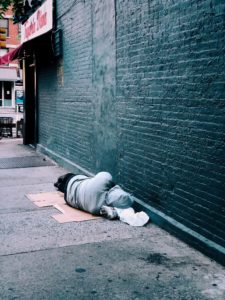
If you think you’re special because you have an addiction, you are wrong. That’s just another one of those false beliefs we all cling to for dear life.
The fact that your addiction happens to be heroin and mine is Cheetos is only relevant in that your addiction is socially unacceptable, but mine is fine. At least, it’s fine legally and socially.
Goody do gooders and legislators for thousands of years have tried to tell us what we can consume or otherwise do with our bodies. It’s never worked and never will. Most governments have yet to understand that they can’t legislate such things. Nor do they understand that in their feeble attempts to do so only works to feed the underbelly of a society. Will they ever learn? I’m still waiting, but not holding my breath.
Finally, your addiction is a hell of a lot more expensive than mine. That is unless I dump so many Cheetos into my body that I get sick. Could happen I guess.
Addicts by the bunches and clusters
There are too many addictions to list, but I’m going to list a few just so you know how un-special you really are. Please note that Cheeto addiction is not on the list. I’m sure there are other Cheeto addicts out there, but we’re not recognized.
- Alcohol addiction
- Drug addiction
- Screen addiction (smart phone, TV, etc.)
- Eating addiction
- Sex addiction
- Shopping addiction
- Shoe addiction
- Gambling addiction
- Work addiction
- Play addiction
- Travel addiction
- Smoking
- , etc., etc., ———————————————– etc.
In the exact words of the American Psychiatry Society, symptoms of addiction fall into one of the following four categories: (1)
- Impaired control: a craving or strong urge to use the substance; desire or failed attempts to cut down or control substance use
- Social problems: substance use causes failure to complete major tasks at work, school or home; social, work or leisure activities are given up or cut back because of substance use
- Risky use: substance is used in risky settings; continued use despite known problems
- Drug effects: tolerance (need for larger amounts to get the same effect); withdrawal symptoms (different for each substance)
Most addictions, including my Cheeto addiction, fall into the first category. Beyond that, things can get really ugly. That said, there is one fact we can both take to the bank. No person, organization, or institution can help rid us of our addiction unless we choose to allow it. The only sure cure without our permission is to kill us, but then there is no more you and no more me.
Let’s discount the killing part and move on to something more productive. Let’s ask a question. Where do our addictions come from? (2)
The answer to that question is not easy. Our genes are a factor without a doubt. (3) However, the triggers are the most important. For some of us it all started with a group of friends (our peer group) or someone we admire convincing us that some chosen drug or a closet full of shoes was cool. Some of us simply wanted a way to veg out. Others of us liked the idea of feeling powerful and full of energy (think meth). Then there are those of us who just wanted a way to get the hell out of Dodge for a while because our life sucked. Maybe we simply liked the high that we got from buying one more thing or the excitement of a possible big win. The beginning may have been to rebel against an authority figure telling us not to use drugs. It could also have started because a massive amount of physical pain led to a prescription for pain medication.
My Cheeto addiction doesn’t screw up my life too much other than the unavoidable urge to drive to the store in the middle of the night because my supply is out. Others of us aren’t so lucky. When an addiction messes with our heads too much, it can make it difficult to make a wise choice as to whether to keep our addiction or scrap it.
Simply plunking us in a rehab center, sentencing us to attend NA or AA, or jailing us doesn’t work and will continue not to work until three things happen.
- We choose to send our addiction on its way.
- Instead of treating the addiction, treat the whole person. To do otherwise is like treating a cobra bite with antibiotic ointment.
- Educate an ignorant public. Unless we are rich and or famous, society sees addiction, particularly drug and alcohol addiction as a sign of weakness. Hell, it’s hard not to feel superior to some dude lying on a sidewalk drugged out of his gourd. It’s fun to put on our better-than-thou superiority shirt. But the fact is we aren’t one whit better. Our addiction might be socially acceptable, or maybe we are fortunate enough to have someone in our life that is keeping us off the street. Regardless, our flaws and addictions are simply less apparent than the guy laying on the sidewalk.

Don’t kick this guy
My addiction is socially acceptable and doesn’t disrupt my life too much other than turning everything I touch orange. However, if my addiction were wrecking my life, or I was stealing from relatives to support my habit, I would get help. That is, of course, unless the substance I was using gave me so much pleasure or relief that it was worth the loss of everything else I valued.
So where would I go for help if my addiction turned my life into a giant piece of chaotic detritus? Keep in mind that the following comes from my opinions that are fraught with my biases. You might have a different process that might yield better results for you. Think for yourself.
The choices are rehab centers, psychiatrists, psychologists, or counselors.
I did a Google search for rehab centers in my area that offer both in-patient and outpatient services. I discovered the in-patient group wouldn’t work for me because of my job and the high cost. The outpatient centers were too far from home. Your situation will be different than mine. If you do opt for a rehab clinic, make sure to carefully check the reviews. In my area, I only found one that I would consider in my state (In the slim chance you’re curious, that would be Washington).
The next question is do I need a psychologist or a psychiatrist? Psychiatrists have more formal education than psychologists and they may be the only choice if I needed meds. (Note: some states are expanding this option to include psychologists). In my Cheeto tinged bias, all that extra education wasn’t worth the fee. That left me with a plethora of psychologists and counselors to choose from.
I decided to opt for a psychologist. Would he or she be better than their less educated counselor comrades? I have no idea, but my personal bias tells me that more education is preferable to less. However, logic tells me that may not be true. I tossed logic and went with bias.
Most psychologists deal with addiction. However, if I had another disorder like ADHD, I would want someone that could help with both disorders simultaneously. I would also want someone geographically close to my home. I have insurance therefore needed to check if the psychologist accepted my insurance.
Note: If I didn’t have insurance or were among the many without extra funds, I wouldn’t let that stop me. Most states offer help and I would try to find it. I would do whatever was necessary including borrowing from friends and family. At the very least, I would attend free Alcoholics Anonymous (AA) or Narcotics Anonymous (NA) meetings.
Once I narrowed the field, I looked at information available on each psychologist that fit the criteria: insurance and location. That narrowed the field down. I also wanted someone with a rich life experience vs someone who graduated high school, went to college, and hung out a shingle. I was also looking for someone who was not interested in substituting one addiction for another. Guess what? I found just the person. He sounded so perfect that I passed his name on to someone I know who I think would benefit from his services.
There are four main take away points to remember: 1. What you choose to do is up to you. 2. If you have an addiction that is screwing up your life, get help. 3. Don’t scorn the guy laying on the sidewalk. You’re no better than he is simply because you have more resources and or your addiction is socially and legally acceptable. 4. We all have addictions/bad habits to work on.
- https://www.psychiatry.org/patients-families/addiction/what-is-addiction
- https://www.recovery.org/addiction/causes/
- Agrawal, A., Verweij, K., Gillespie, N. et al. The genetics of addiction—a translational perspective. Transl Psychiatry 2, e140 (2012). https://doi.org/10.1038/tp.2012.54




